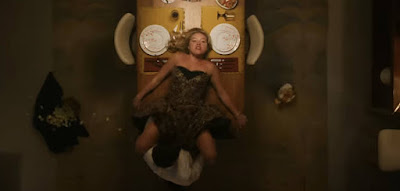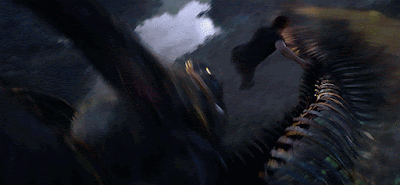or
Who's Afraid of Olivia Wilde?
"You have a lovely home," murmurs Frank (Chris Pine) as he's welcomed to a dinner at the Technicolor dream-house of Jack and Alice Chambers (Harry Styles, Florence Pugh). And of course it is. It's a vision of America right out of TV sit-come 50's-60's, where the wives wear make-up all day, make a multi-course meal and go skipping to the door with a drink in their hand to greet the man who's come home from work...of an unknown and not-talked about nature.
It's a man's world, even if the shows made a pretext that the woman was secretly in charge (Really, do you think that Elizabeth Montgomery's all-powerful witch Samantha would really put up with ad-exec husband Darren's boobish "Sam, I'm the man of the house and what I say goes" before turning him back into a chimpanzee?) And Jack and the rabbit-holed Alice live in a cul-de-sac community in a desertish sub-division surrounded by mountains. The husbands drive off in their dream-cars, while the women do their house-work, listening to lectures by Frank about achieving the dream-existence, the perfect life, outside of the chaos everybody else puts up with. The men are off working on Frank's "Victory Project" off in the mountains doing...something...but every so often their world is rocked by temblors, which are dismissed with an off-hand "Boys with their Toys" remark to go back to sunning themselves and sipping their scotch-and-sodas.It's all as fake as the blue on Jack's business-suit, but nobody questions it. Nobody asks questions. Life is good. Don't rock the boat (even if the ground does rock from time to time). At the neighborhood ballet class, the mantra is "there is beauty in control, grace in symmetry, we are as one". But there are cracks showing up in the veneer of this world just like the cracks in the sun-baked asphalt of the community streets.
Little things, like the rumor about the neighbor who walked outside the Victory City limits with her son, and only she returned. I mean there were the "Warning! Employees Only Beyond This Point (Hazardous Materials)" signs, that are ubiquitous beyond the trolley route (the trolleys have signs that say "What you See Here/What You Do Here/What You Hear Here/Let's Let It Stay Here") and the bad dreams that Alice has of dilating eyes and chorus-girls in Busby Berkley-like dance routines—that turn nightmarish. Sometimes, the eggs that Alice cooks for her Instagram-perfect meals are empty. Walls start closing in during the daily cleaning, to the sound of Frank's "Shatnering" (Pine really gets into it a couple of times).
And then, there's the plane. Alice sees it—a vintage red prop-plane—that flies overhead one day, shimmers in the air, and starts to spiral down into the hills surrounding the enclave. Alice runs out into the desert, past the warning signs, up to the prominent hill where "the boys" go to work and bangs on the structure trying to get help for the crashed passengers, but, no one answers her call. Instead, a bunch of beefy security guys in red suits appear out of nowhere and haul her away...to be corrected...before returning her back to the neighborhood.
Just what is going on in Don't Worry Darling, Olivia Wilde's sophomore directorial effort (after the hilarious and hyper Booksmart) is teased for the first 2/3 of the movie with the too-slick veneer of the film constantly being smudged by the encroaching feeling that something is "terribly, terribly wrong" (as they say in the "True Crime" docs)...but what? Is it the demands of satire, or some Shyamalanian twist that will sneak up on you at the end? Don't Worry Darling is full of incident that makes you wonder what's real, what's a dream, and what's a delusion while rarely giving you a focal point of where the truth lies.We've seen this game-plan before. "Wandavision" did it recently. For those with more media savvy, there are doses of The Matrix and The Stepford Wives with doses of "The Twilight Zone"(s), "Black Mirror," and "The Prisoner" TV show (both versions, in fact) mixed in. It has the disadvantage of being feature length (half-hours are ideal) with the burden of wrapping things up at the end (which it does, probably not to everyone's satisfaction...but, as a "Prisoner" fan, I don't mind a little ambiguity), but doesn't take the cop-out of cliff-hangers, or taking the "X-Files" route of just ending without explanation.
But, it also hints at elements in "the real world" (such as it is) like any "no, really, we're helping YOU" cult—along the lines of Synanon, EST, Scientology, Jonestown and Trump-land—that promises some sort of fulfillment, when the only thing that's being filled is the leader's bank account (we never know Frank's last name...it could be "Ponzi"). One could see it as a comment on "crazy cures" and conspiracy theories and their influence on a gullible, privileged society—it certainly fits—especially in regards to people who spend endless hours watching the latest News from Wackyland (or long-winded movie reviews) on their computers. Don't Worry Darling is merely an extension of that.
But, with all those references to hold a broken mirror up to, there is one more comparison to a movie (based on the play) that I want to make—Who's Afraid of Virginia Woolf? Both films deal with the lengths—bordering on control games and shared illusions—that a troubled and failing couple might go to in order to maintain the relationship, whether for personal need or in order to just maintain a semblance of an easier status quo. There is desperation there and Don't Worry Darling maintains a constant feeling of desperation...and unease.
The third act also has some desperation problems, as well—trying to create an action-filled third act (which, unfortunately, undercuts some of the movie-logic needed to gird the film), but as long as one isn't a stickler for continuity's sake, one will find Don't Worry Darling a finely crafted tale of "disturbia" with impeccable direction and design—the music choices are inspired and John Powell's music, superb—all supported by a plucky "in-every-frame" performance by Florence Pugh that is brave, believable, and, at times, horrorific. The movie is worth seeing, just to see her.*
* Notice I haven't mentioned any of the garbage about the premiere publicity from the entertainment press and (worse) social media? The reason is it's worse than irrelevant, it's distracting. Which, in a wonderful irony, only makes the movie's point.


















